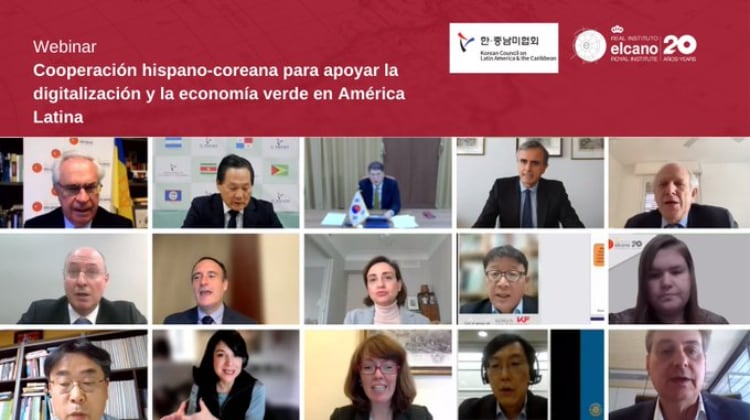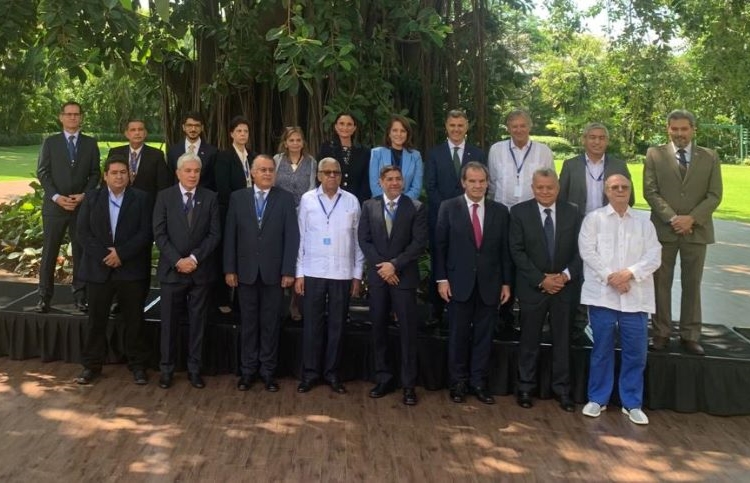Marta Martínez
Spain and South Korea are working together to achieve a digitalisation project in the Latin American region, according to a webinar organised by the Royal Elcano Institute, in collaboration with the Korea Foundation and the KCLAC (Korean Council on Latin America and the Caribbean).
At the meeting, held last Tuesday, Shin Soon-chull, president of KCLAC, pointed out that, although the project was initiated a few years ago, now after the COVID 19 pandemic, experts are asking themselves “what kind of world will we be in after suffering the consequences of Covid-19?.
Both Spain and Korea want to take advantage of the opportunities offered by the pandemic to boost digitalisation and improve the sustainable economy in Latin America, according to Carlos Malamud, senior researcher at the Elcano Royal Institute.
All this, in addition to the fact that, as César Buenadicha, head of the Discovery Unit, IDB Lab (Inter-American Development Bank), explained, Latin America is becoming one of the most favourable places for innovation and digital transformation.
Monica Araya, Advisor on Decarbonisation Strategies and member of the European Climate Foundation, agreed with him on this point. She added that the region will only move forward when the natural capital that Latin America possesses is given the importance it deserves.
Luis Pedrosa Rebolleda, Director of Strategy for Energy Transition, Tecnalia, supported the idea, defending the use of the green economy to generate wealth in Latin America.
César Buenadicha, however, pointed out the challenges that stand in the way of achieving these goals: structural inequality and the connectivity and digital skills gaps that exist in the region.
Ana Valero, Director of Regulatory Policy at Telefónica Hispam, also spoke at the webinar. Valero stressed that, although connectivity is the basis for digitalisation, it is not enough on its own to bring it about. He insisted that 38% of people living in areas of Latin America where there is connectivity do not use the internet.
Kisu Kwon, Executive Director of KCLAC, explained that Spain and Korea can complement each other in digital cooperation. He indicated that Spain is stronger in the field of public services, telephony and banking, while Korea has a strong digital service but is not internationalised, and pointed out that Spanish startups are more internationalised than Korean startups.
Kwon ruled that the Korea-Spain team can be very useful in bringing together investors in Latin America and the Caribbean, as well as in developing government-to-government cooperation with support for SMEs and startups.
Spain is also well positioned within EU programmes, according to Raquel Jorge Ricart, researcher at the Real Instituto Elcano. The EU and Korea – she explained – are almost innate partners in terms of digitalisation and innovation and, with all this, innovation, financing, matching and cooperation between different ecosystems can be carried out between countries.
Another of the Royal Institute’s senior researchers, Lara Lázaro Touza, addressed the issue of the sustainable economy. She explained that, in the selection of transformative projects to develop a sustainable economy, funds have been allocated to the transport, construction and energy sectors.
According to Seunghwan Jeon, representative in Colombia of the Korea Environmental Industry & Technology Institute (KEITI), the basic strategy is to achieve results and extract them in Latin American countries, identifying the needs of governments and developing Korean government assistance programmes.







